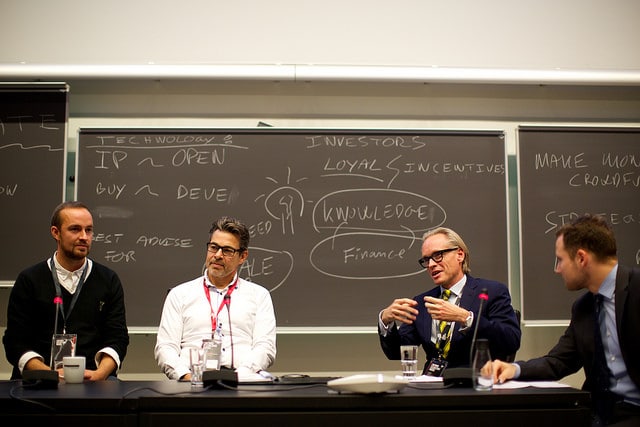Photo credit: Sebastiaan ter Burg
We have wrapped up Day 2 of CSW Europe with some food for thought on where crowdfunding is heading next. What is brand new today will be common tomorrow. But the challenge is to make investors and entrepreneurs grasp how to get to this stage and what input it requires.
Investing: playing with the fire?
“Magic is easy. Impossible might take some time,” says Gadi Mazor from OurCrowd. The impossible would in this case involve forging new models of investment and creating platforms where angels and startups can easily match for the benefit of both. What to do with risks though? CEO and co-founder of Investdor Lasse Makela notes that a common fear of investors is to wait for revenues for a decade and eventually get zero.
Regulation of crowdfunding incentives on the EU level is in hot water too. Even though crowdfunding is an expanding part of the ecosystem, for EU public bodies it is still a marginal topic. Oliver Gajda from European Crowdfunding Network advises on convincing national governments first to make it reach Brussels level. But good news is that crowdfunding has been already accepted as a unique part of the financial system. So put a tick in the first box.
Education for acceleration
In Denmark alone 98% of entrepreneurs go to banks to ask for loans. And if the bank says ‘no’, then vast majority just gives up. Here we have another challenge for the future – to raise awareness that it is not a deadlock and there is alternative financing. On the other hand, hesitant investors should see benefits, not only threats of investing in innovative projects.
What all of our speakers stress today is that education is vital and investors cannot play teachers for companies. Instead of giving a fish to young entrepreneurs, they should give a fishing rod. And digital transparency also urges users to be more financially literate as they can now calculate their benefits and losses. Crowdfunding platform for African development projects MYC4.com has 20,000 projects with 10,000 euro invested. It is a good example of giving power to entrepreneurs to develop their credit history independently.
Time for strategic innovation
Today crowdfunding is something limited only to “super-early-adopting consumer”, as Karsten Wenzlaff, German Crowdfunding Network, points out. But…
The scope is growing and platforms have to be innovative to stay afloat. Only platforms? Projects as well if they want to stand out of the crowd of another hundred or thousand projects. CTO of Syndicate Room Tom Britton has brought up a topic of innovation in startups. “Testing the water” and assessing if there is a market for your project is the first point on ‘to do’ list before any idea takes off the ground.
Moreover, financing systems need to rearrange their approach to doing business and innovate as well. Chris Skinner proposes a triple change: for business model, architecture and organization. Now it is about digital structures where the core is community, not a product itself.
The key words that we’ve heard throughout the day were transparency, change, education and awareness. If we want to foresee what crowdfunding will bring us tomorrow, we have to assess what ideas we have today. And to what extent we are ready to learn, risk and transform the current system?




0 Comments